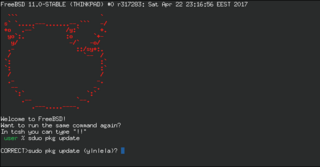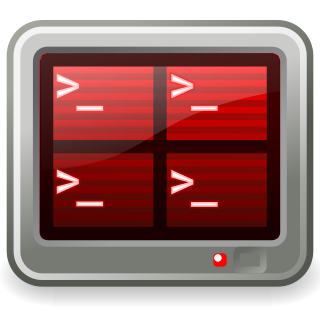
tcsh is a Unix shell based on and backward compatible with the C shell (csh).

Advanced package tool, or APT, is a free-software user interface that works with core libraries to handle the installation and removal of software on Debian and Debian-based Linux distributions. APT simplifies the process of managing software on Unix-like computer systems by automating the retrieval, configuration and installation of software packages, either from precompiled files or by compiling source code.

Blackbox is a free and open-source stacking window manager for the X Window System.
phpLDAPadmin is a web app for administering Lightweight Directory Access Protocol (LDAP) servers. It's written in the PHP programming language, and is licensed under the GNU General Public License. The application is available in 14 languages and supports UTF-8 encoded directory strings.
Filesystem in Userspace (FUSE) is a software interface for Unix and Unix-like computer operating systems that lets non-privileged users create their own file systems without editing kernel code. This is achieved by running file system code in user space while the FUSE module provides only a bridge to the actual kernel interfaces.
AppImage is an open-source format for distributing portable software on Linux. It aims to allow the installation of binary software independently of specific Linux distributions, a concept often referred to as upstream packaging. As a result, one AppImage can be installed and run across Ubuntu, Arch Linux, and Red Hat Enterprise Linux without needing to use different files. It aims to be a format that is self-contained, rootless, and independent of the underlying Linux distribution.

PulseAudio is a network-capable sound server program distributed via the freedesktop.org project. It runs mainly on Linux, including Windows Subsystem for Linux on Microsoft Windows and Termux on Android; various BSD distributions such as FreeBSD, OpenBSD, and macOS; as well as Illumos distributions and the Solaris operating system. It serves as a middleware in between applications and hardware and handles raw PCM audio streams.
This is a comparison of notable free and open-source configuration management software, suitable for tasks like server configuration, orchestration and infrastructure as code typically performed by a system administrator.

Jami is a SIP-compatible distributed peer-to-peer softphone and SIP-based instant messenger for Linux, Microsoft Windows, macOS, iOS, and Android. Jami was developed and maintained by the Canadian company Savoir-faire Linux, and with the help of a global community of users and contributors, Jami positions itself as a potential free Skype replacement.

The TurnKey Linux Virtual Appliance Library is a free open-source software project which develops a range of Debian-based pre-packaged server software appliances. Turnkey appliances can be deployed as a virtual machine, in cloud computing services such as Amazon Web Services or installed in physical computers.
In computing, klibc is a minimalistic subset of the standard C library developed by H. Peter Anvin. It was developed mainly to be used during the Linux startup process, and it is part of the early user space, i.e. components used during kernel startup, but which do not run in kernel mode. These components do not have access to the standard library used by normal userspace programs.

SMPlayer is a cross-platform graphical front-end for MPlayer and mpv and forks of Mplayer using GUI widgets offered by Qt. SMPlayer is free and open-source software subject to the terms of the GNU General Public License version 2 or later. SMplayer has been localized in more than 30 languages.

OpenZFS is an open-source implementation of the ZFS file system and volume manager initially developed by Sun Microsystems for the Solaris operating system and now maintained by the OpenZFS Project. It supports features like data compression, data deduplication, copy-on-write clones, snapshots, and RAID-Z. It also supports the creation of virtual devices, which allows for the creation of file systems that span multiple disks.
Bup is a Backup system written in Python. It uses several formats from Git but is capable of handling very large files like operating system images. It has block-based deduplication and optional par2-based error correction.
git-annex is a distributed file synchronization system written in Haskell. It aims to solve the problem of sharing and synchronizing collections of large files independent from a commercial service or even a central server.

Flatpak is a utility for software deployment and package management for Linux. It is advertised as offering a sandbox environment in which users can run application software in isolation from the rest of the system. Flatpak, in 2016, was known as xdg-app.

Windows Subsystem for Linux (WSL) is a feature of Microsoft Windows that allows developers to run a Linux environment without the need for a separate virtual machine or dual booting. There are two versions of WSL: WSL 1 and WSL 2. WSL is not available to all Windows 10 users by default. It can be installed either by joining the Windows Insider program or manually via Microsoft Store or Winget.

GNOME SoundConverter is an unofficial GNOME-based free and open-source transcoder for digital audio files. It uses GStreamer for input and output files. It has multi threaded design and can also extract the audio from video files.

Lector is a free e-book reading application for desktop Linux systems that also has basic collection management features.

GNOME Terminator is a free and open-source terminal emulator for Linux programmed in Python, licensed under GPL-2.0-only. The goal of the project is to produce a useful tool for arranging terminals. It is inspired by programs such as gnome-multi-term, QuadKonsole, etc. In that the main focus is arranging terminals in grids. Terminator packages exist for Arch, Debian/Ubuntu, Fedora, OpenSUSE, Gentoo, Snap, FreeBSD, OpenBSD. In 2017 took second place in voting at opensource.com, after Gnome Terminal.











